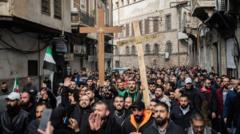In a shocking turn of events, protests erupted across Syria this week following the arson of a Christmas tree in Suqaylabiyah, a town predominantly inhabited by Christians. The incident has ignited concerns over the security of minority rights under the new Islamist authorities, specifically the group Hayat Tahrir al-Sham (HTS), which emerged after the recent topple of President Bashar al-Assad.
Dramatic footage circulated on social media showcased the moment the Christmas tree went up in flames in the town's central square, as vigilantes were seen either extinguishing the blaze or fueling it. This act of desecration, occurring just before Christmas Eve festivities, prompted immediate public outcry and calls for urgent intervention from the new government.
HTS has since detained several foreign fighters purportedly involved in the incident. Leading representatives from HTS met with demonstrators in Suqaylabiyah to express their commitment to protecting the rights and freedoms of all religious groups, even performing an unprecedented act of solidarity by displaying a cross.
Following the arson, larger demonstrations spread to the capital city, Damascus, where protesters expressed their frustration towards foreign fighters, chanting, "Syria is free, non-Syrians should leave." Another group in the Bab Touma neighborhood displayed crosses and national flags, vowing to defend their Christian heritage, with one demonstrator lamenting the potential loss of their faith in their home.
The recent upheaval has stirred fear among Syria's diverse religious minorities, including Kurds, Armenians, Assyrians, Christians, Druze, Alawite Shia, and Arab Sunnis. In light of these tensions, the UN has emphasized the necessity for the new leadership to uphold promises regarding minority rights.
As displaced Syrians begin to return to their homeland following the collapse of the Assad regime, uncertainty lingers regarding HTS’s governance strategy. Although the group has historically been linked with radical jihadist origins, it appears to be adopting a more moderate, inclusive approach aimed at uniting various factions.
Recent announcements indicated a potential restructuring of the Ministry of Defence to incorporate rebel fighters into a cohesive unit under HTS’s command. Despite these intentions, skepticism remains as multiple factions continue to operate in the region, complicating the assurance of stability in a post-Assad Syria.
Internationally, HTS faces scrutiny, still marked as a terrorist organization by numerous countries. However, recent diplomatic dialogues suggest a potential shift in perception, with the U.S. rescinding a significant bounty on HTS's leadership — suggesting an evolving stance towards this complex conflict.
With numerous challenges ahead, the new Islamist authorities are tasked with proving their ability to maintain security and harmony, especially for minority groups following the tumultuous changes in Syria's sociopolitical landscape.
Dramatic footage circulated on social media showcased the moment the Christmas tree went up in flames in the town's central square, as vigilantes were seen either extinguishing the blaze or fueling it. This act of desecration, occurring just before Christmas Eve festivities, prompted immediate public outcry and calls for urgent intervention from the new government.
HTS has since detained several foreign fighters purportedly involved in the incident. Leading representatives from HTS met with demonstrators in Suqaylabiyah to express their commitment to protecting the rights and freedoms of all religious groups, even performing an unprecedented act of solidarity by displaying a cross.
Following the arson, larger demonstrations spread to the capital city, Damascus, where protesters expressed their frustration towards foreign fighters, chanting, "Syria is free, non-Syrians should leave." Another group in the Bab Touma neighborhood displayed crosses and national flags, vowing to defend their Christian heritage, with one demonstrator lamenting the potential loss of their faith in their home.
The recent upheaval has stirred fear among Syria's diverse religious minorities, including Kurds, Armenians, Assyrians, Christians, Druze, Alawite Shia, and Arab Sunnis. In light of these tensions, the UN has emphasized the necessity for the new leadership to uphold promises regarding minority rights.
As displaced Syrians begin to return to their homeland following the collapse of the Assad regime, uncertainty lingers regarding HTS’s governance strategy. Although the group has historically been linked with radical jihadist origins, it appears to be adopting a more moderate, inclusive approach aimed at uniting various factions.
Recent announcements indicated a potential restructuring of the Ministry of Defence to incorporate rebel fighters into a cohesive unit under HTS’s command. Despite these intentions, skepticism remains as multiple factions continue to operate in the region, complicating the assurance of stability in a post-Assad Syria.
Internationally, HTS faces scrutiny, still marked as a terrorist organization by numerous countries. However, recent diplomatic dialogues suggest a potential shift in perception, with the U.S. rescinding a significant bounty on HTS's leadership — suggesting an evolving stance towards this complex conflict.
With numerous challenges ahead, the new Islamist authorities are tasked with proving their ability to maintain security and harmony, especially for minority groups following the tumultuous changes in Syria's sociopolitical landscape.


















